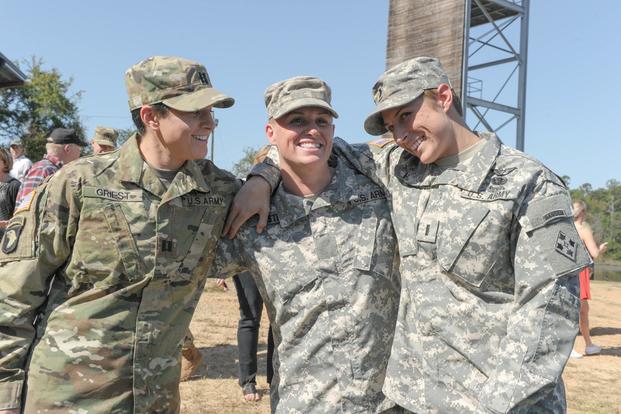The U.S. Army's vice chief of staff praised the achievements of female soldiers Monday, describing how small numbers of women continue to join infantry and armored combat units and graduate from the service's most grueling training course.
"Ten women have graduated from Ranger School, which is our toughest school. We have a woman commanding a company in the 82nd Airborne Division, an infantry company," Gen. James McConville told an audience at the Future of War 2018 conference sponsored by New America and Arizona State University.
The general's count did not include two women who graduated from Ranger School on Friday, bringing the total to 12, officials said Tuesday.
It's been five years since former Defense Secretary Leon Panetta lifted a ban on women serving in combat roles. Three years ago, the Army launched a historic effort to open Ranger School to female applicants.
Out of the 19 women who originally volunteered in April 2015, Capt. Kristen Griest and 1st Lt. Shaye Haver became the first women to earn the coveted Ranger Tab that August. A third woman graduated that October.
They accomplished a hard-won feat that has eluded many male soldiers since the course was founded in 1952. Ranger School is a 62-day course described as the Army's premier infantry leadership course; an ordeal that pushes students to their physical and mental limits.
On average, only about 40 percent of men successfully complete the course, Army officials maintain. And only about 25 percent of Ranger School students graduate without having to repeat at least one phase of the grueling course.
"We have 170,000 women serving in the Army -- 170,000, that is almost the size of the Marine Corps," McConville said. "We have women in every single infantry, armor and artillery battalion and every single brigade combat team in the Army."
The Army currently has 600 women in infantry and armor jobs, McConville said.
Initially, female officers who completed the training standards for infantry and armor were sent to Fort Bragg, North Carolina, and Fort Hood, Texas. The Army is expanding that policy to include installations such as Fort Campbell, Kentucky ,and Fort Carson, Colorado, McConville said at the Association of the United States Army's Global Force Symposium in March.
"If you meet the standards, you can serve anywhere you want in the United States Army," he said at AUSA. "Women are meeting the standards, and they are doing well."
-- Editor's Note: This story has been updated to show that 12 women have graduated from Ranger School.
-- Matthew Cox can be reached at matthew.cox@military.com.












